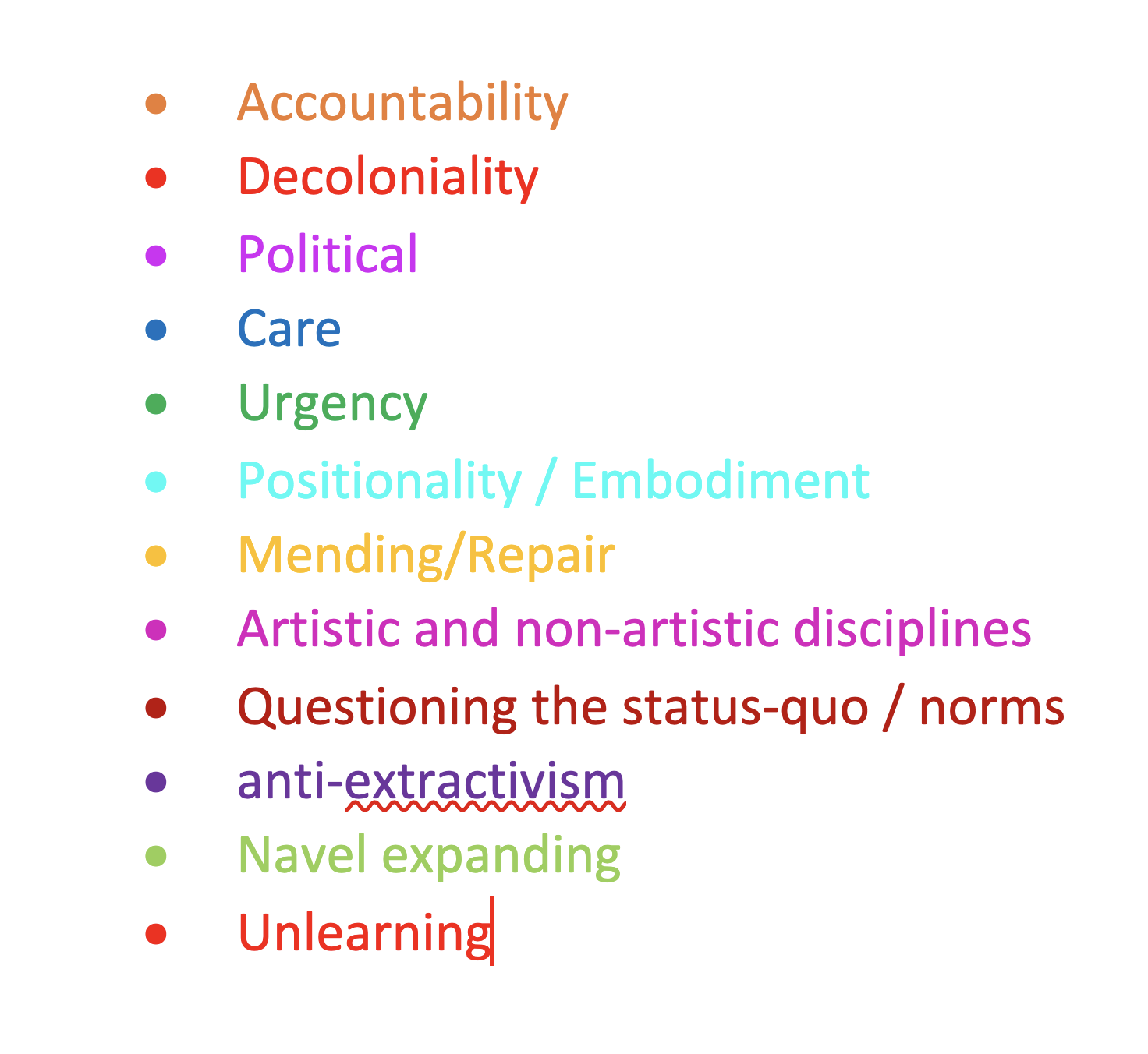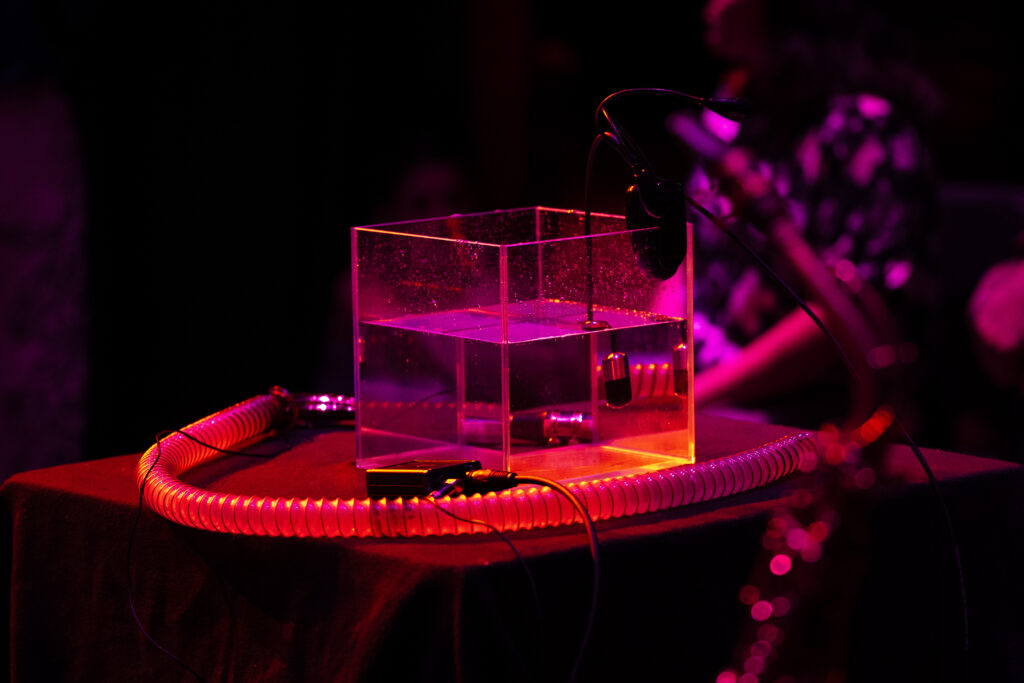| Date | 12/20/2022 |
| Time | 20:21 |
| Location | Willem de Kooning Academy |
| Researchers | |
| Affiliated research project |
|
We (teachers and researchers in Social Practices) agreed on speaking as a we, as a body. Our bodies contain knowledge, our bodies are complex, entangled, contaminated, contradictory, our bodies are communities, our bodies sweat, dance, eat, digest, grow, rest, decay, transition, die, return.
Otherwise, is the search for the possibility of living differently grounded in socially engaged urgencies of mending and dreaming whilst disrupting the status quo, communally and collectively. With opposition, you are always in relation to something, in reaction. ‘Otherwise’ is something else, aposition. It is not an attempt to reclaim what has been lost but a search for other modes of existence.
‘Beginning with the body’ – What is it made of? Where is it situated and what is it responding to? Can you reclaim it?
What is it made of– what is Social Practices if not caring and dreaming?
The body can become a roadmap to return to ourselves and gain clarity on not just what we are fighting against, but what we truly want. – Stephanie Cariaga
Social Practices aims to disrupt the status quo through art and pedagogy focusing on collectiveness, togetherness, and community. In Social Practices, we often work in multi-disciplinary activities between artistic and non-artistic disciplines and question the role of art, design, or any form of cultural activity and labor.
Social Practices that are socially engaged are inherently political. To engage art and design with the personal and political is to challenge the construction of the individual artist and designer. The political is never appealing because it is confrontational, urgent, material, and personal. We are socialised for stability and certainty and expectations of safety. The political is much more flexible, fluid, uncertain, and full of cracks.
In our practices, we commit to systemic change and collective action with different relations to urgency and urgent matters. Urgency can be fast, requiring immediate, necessary direct action. Urgency can be slow, unfolding at the pace of the relational, building trust, and meeting others. It is a pace that requires time, attention, care, and love. Urgency is experienced differently. Time is experienced differently. And our work might set ecologies and metabolic processes in motion with no guarantee of immediate results or measurable impact, even in our lifetimes.
Where is it situated– what type of education might allow us to engage with other forms of relationality other than transactional ones, invite us to sit with contradictions, ambiguities, and stay with the trouble?
To be marooned, a fugitive in flight, is not always a bad thing. It can only mean, at the best of times, that one is pursuing love. – Joy James
Global crises increasingly shows that our current educational systems and learning paradigms are insufficient and, in some cases, threatening to life. These paradigms offer promises of unimpeded growth and progress, at the detriment of living beings and the planet. We want to break with that narrative set up by the established order so that we can conjure up new ways of thinking about the world.
In Social Practices, we are not using cultural production to generate awareness on social issues but raising consciousness. Consciousness raising is a practice of understanding the conditions of systemic oppression, revealing the structures, and then acting upon that knowledge. We challenge the myth of separability (reinforced by modernity and coloniality) and acknowledge our entanglement in social issues and the world. Our entanglement calls for community accountability, a shared commitment to reveal, own up to, and dismantle the conditions that perpetuate harm.
Can you reclaim it – what are the methods to address, explore and unlearn the dimensions of oppression, power and privilege that are part of our own lives, relations, tools, structures, histories and beliefs?
[we are] contradictory, [we are] both coloniser and colonised, [we are] representing a system that is collapsing and dying, [we are] encountering cracks everywhere, [we are] not the ones inventing the cracks but [we are] searching for the cracks and the possibility of letting the light in, [we are] beings, able to hold contradictions – Social Practices tutors in assembly
Our creative endeavors arise from our involvement in a world that can leave us feeling a variety of things; from bewilderment and despair to communal joy and happiness, while remaining in relation.
Community accountability means developing an arts of noticing [1] and acknowledging our intimate entanglement in a damaged system, of being in others’ pain. This statement might generate feelings of discomfort, of being adrift in an uncaring world. Yet how about giving voice in discomfort as a learning step? Education should be about supporting people to face all the possibilities, the good, the bad, the broken, and the messed up.[2] And to acknowledge our complicity in systemic harm (historical and ongoing).
Our practices are decolonial. This word, decolonial, is quite complex; the process as well. One way to think about it is through making cracks, criticality in the cracks. We search for the cracks in the dominant practices, behaviors and knowledge structures that are working against life by imagining an otherwise. We strive to unlearn behaviors of oppression, power and privilege in order to continue building networks of support within the contradictions.
As social practitioners, we offer our commitment to practice slowness and pauses as an active process of reading, listening, breathing, and being. The cracks invite us to be intentional about the pauses and reflect critically with meaning. To teach and learn and research with our senses, stories, knowledges, minds, and bodies. We promise situated, embodied learning combined with self-reflection and willingness to go deeper.
Rotterdam, 20.12.2022
This living document was developed over a series of collaborative workshops and writing sessions together with present and former Social Practices tutors, Research Lecturers, Program Leader and Research Professor Social Practices throughout 2021/2022. A writing team, Sumia Jaama, Jessy Koeiman and Michelle Teran, worked on edits and drafts. With the writing team, the co-authors of In Search of Otherwise (A)Positional Paper: Social Practices are Clara Balaguer, Lila Athanasiadou, Golnar Abbasi, Fyn van Ast, Selçuk Balamir, Milena Bonilla Galeano, Sofia Boschat-Thorez, Teana Boston-Mammah, Seecum Cheung, Bibi Fadlalla, Gabriel Fontana, Sami Hammana, Carmen José, Pablo Lerma Gonzalez, Rosa Pons-Cerdà, Pris Roos, Kari Robertson, Sara Sallam, Bobby Sayers, Iris Schutten, Irina Shapiro and Amy Suo Wu.
Footnotes:
[1] Anna Lowenhaupt Tsing, The Mushroom at the End of the World: On the Possibility of Life in Capitalist Ruins (Princeton, New Jersey: Princeton University Press, 2015), 17.
[2] Vanessa Machado de Oliveria, Hospicing Modernity: Facing Humanity’s Wrongs and the Implications for Social Activism, (Berkeley, North Atlantic Books, 2021), 121-122.
Sources and Further Reading:
adrienne maree brown, Holding Change: The Way of Emergent Strategy Facilitation and Mediation, (Chico CA: AK Press, 2021).
Victoria Adukwei Bulley, Quiet, ( London: Faber & Faber, 2022).
Ana Clarissa Rojas Durazo, “In Our Hands: Community Accountability as Pedagogical Strategy,” Alt-Press Watch (APW) 37, 76 (2011/2012).
El-Kurd, M. Rifqa, (Chicago: Haymarket Books, 2021).
Education for Liberation Network & Critical Resistance Editorial Collective, Lessons in Liberation: An Abolitionist Toolkit for Educators, (Chico CA: AK Press, 2021).
Alexis Pauline Gumbs, Undrowned: Black Feminist Lessons from Marine Mammals, (Chico CA: AK Press, 2020).
Stefao Harney & Fred Moten, The Undercommons: Fugitive Planning & Black Study, (London: Minor Compositions, 2013).
Saidiya Hartman & Fred Moten, “Fugitivity and Waywardness, ” Arika, 27 Sept. 2014, https://arika.org.uk/fugitivity-and-waywardness/.
bell hooks, Teaching to Transgress, (London: Routledge, 2014).
Vanessa Machado de Oliveira, Hospicing Modernity: Facing Humanity’s Wrongs and the Implications for Social Activism, (Berkeley: North Atlantic Books, 2021).
Walter D. Mignolo and Catherine E. Walsh, On Decoloniality: Concept, Analytics, Praxis, (Durham: Duke University Press, 2018).`
Alexis Shotwell, Against Purity: Living Ethically in Compromised Times, (Minneapolis: University of Minnesota Press, 2016).
Lola Olufemi, Experiments in Imagining Otherwise, (London: Hajar Press, 2021).
Koleka Putuma, Collective Amnesia, (Durban: uHlanga, 2017).
Anna Lowenhaupt Tsing, The Mushroom at the End of the World: On the Possibility of Life in Capitalist Ruins, (Princeton: Princeton University Press, 2015).
Glorian Wekker, White Innocence: Paradoxes of Colonialism and Race, (Duke University Press., 2016).
Kyle Whyte, “Too Late for Indigenous Climate Justice: Ecological and Relational Tipping Points,” Wiley Interdisciplinary Reviews: Climate Change, 11(1), 2020, pp. 1-7.
Alice Coltrane – Eternity * Black Quantum Futurism * School for Multi-Species Knowledges * Queers4Climate * The Black Archives * Gesturing Towards Decolonial Futures Collective * Audre Lorde Project * Sarmad * Cultural Workers Unite * Global Tapestry of Alternatives (GTA) * Pirate Care * INLAND * Free Home University * Shell Must Fall * Garage School Fermentation * Anti-Gentrification School * P.A.I.N. * KOZP * Britto Arts Trust * The Niteshop * Foresta Collective * SPIN Collective * The Black School * Rotterdam Ballroom Arena * Serenity Department * Caribbean Ancestry Club * The Nest Collective * Feminist Health Care Group *




